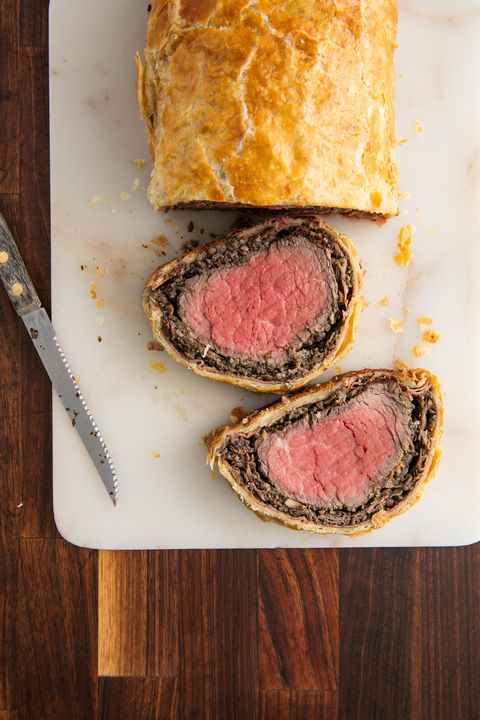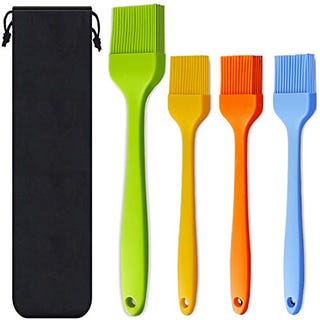What Cut of Beef Do You Use in Beef Wellington
So, you've decided to make Beef Wellington. Congratulations! You are about to make your dinner guests extremely happy. While the origins of this famous dish are unknown, wedoknow it's a holiday showstopper that it isnot for the faint of heart. Below, we break down all the elements of a classic Beef Wellington from the inside out, so you can fearlessly make the best Wellington you can. We believe in you!
The Meat
We're starting with one of the most tender cuts of beef ever—the tenderloin! Beef tenderloin is super delicious, but without bones or much marbling, it'snot the most flavorful cut of beef in the world. That is why we season liberally. (Read: about 1 teaspoon kosher salt per pound.) That is also why we sear the meat before anything else. Browning the meat on all sides, including the ends, does SO MUCH for the flavor of the Wellington as a whole.
The Mustard
To add another layer of complexity to the finished product, brush the seared tenderloin with mustard. Feel free to use your favorite type—we love a variety with some heat like dijon or spicy brown mustard.
The Mushrooms
AKA the duxelle, this mixture of mushrooms, shallots, and thyme is SUPER savory. As if beef tenderloin wasn't bringing enough umami, this mixture takes it to the next level. Word to the wise: don't try to speed up the cooking process on this one, you realllllly want to cook out as much of the moisture as possible. If you don't, the mushrooms will continue to lose moisture when you're baking the Wellington, which could lead to a soggy bottom.
The Prosciutto
Speaking of soggy bottoms (or more specifically, how to avoid them) meet your new bestie: prosciutto! Wrapping your tenderloin in prosciutto is a little extra insurance. It provides a barrier for moisture, and on top of that it adds even more delicious meaty flavor. By shingling a layer of prosciutto onto a layer of plastic wrap, you can easily spread your duxelle in an even layer and wrap your tenderloin evenly. It's a win/win!
The Pastry
Some people like to make their own puff pastry for their Beef Wellington. Those people are crazy. Well, maybe not crazy, but definitely overachievers. We've found that, not only is store bought puff pastry much more convenient, but it's also incredibly delicious. We're particularly fond of this brand, and honestly don't think we could make a better version if we tried. If you DO want to attempt making your own, check out this step by step guide from our friends over at the Kitchn.
Made this? Let us know how it went in the comment section below!
Cal/Serv: 637
Yields: 6 servings
Prep Time: 0 hours 15 mins
Total Time: 2 hours 30 mins
1 (2 lb.) center-cut beef tenderloin, trimmed
kosher salt
freshly ground black pepper
extra-virgin olive oil, for greasing
2 tbsp. Dijon mustard
1 1/2 lb. mixed mushrooms, roughly chopped
1 shallot, roughly chopped
Leaves from 1 thyme sprig
2 tbsp. unsalted butter
12 thin slices prosciutto
all-purpose flour, for dusting
14 oz. frozen puff pastry, thawed
1 large egg, beaten
flaky salt, for sprinkling
This ingredient shopping module is created and maintained by a third party, and imported onto this page. You may be able to find more information about this and similar content on their web site.
- Using kitchen twine, tie tenderloin in 4 places. Season generously with salt and pepper.
- Over high heat, coat bottom of a heavy skillet with olive oil. Once pan is nearly smoking, sear tenderloin until well-browned on all sides, including the ends, about 2 minutes per side (12 minutes total). Transfer to a plate. When cool enough to handle, snip off twine and coat all sides with mustard. Let cool in fridge.
- Meanwhile, make duxelles: In a food processor, pulse mushrooms, shallots, and thyme until finely chopped.
- To skillet, add butter and melt over medium heat. Add mushroom mixture and cook until liquid has evaporated, about 25 minutes. Season with salt and pepper, then let cool in fridge.
- Place plastic wrap down on a work surface, overlapping so that it's twice the length and width of the tenderloin. Shingle the prosciutto on the plastic wrap into a rectangle that's big enough to cover the whole tenderloin. Spread the duxelles evenly and thinly over the prosciutto.
- Season tenderloin, then place it at the bottom of the prosciutto. Roll meat into prosciutto-mushroom mixture, using plastic wrap to roll tightly. Tuck ends of prosciutto as you roll, then twist ends of plastic wrap tightly into a log and transfer to fridge to chill (this helps it maintain its shape).
- Heat oven to 425°. Lightly flour your work surface, then spread out puff pastry and roll it into a rectangle that will cover the tenderloin (just a little bigger than the prosciutto rectangle you just made!). Remove tenderloin from plastic wrap and place on bottom of puff pastry. Brush the other three edges of the pastry with egg wash, then tightly roll beef into pastry.
- Once the log is fully covered in puff pastry, trim any extra pastry, then crimp edges with a fork to seal well. Wrap roll in plastic wrap to get a really tight cylinder, then chill for 20 minutes.
- Remove plastic wrap, then transfer roll to a foil-lined baking sheet. Brush with egg wash and sprinkle with flaky salt.
- Bake until pastry is golden and the center registers 120°F for medium-rare, about 40 to 45 minutes. Let rest 10 minutes before carving and serving.
Nutrition (per serving): 637 calories, 50 g protein, 40 g carbohydrates, 3 g fiber, 4 g sugar, 36 g fat, 15 g saturated fat, 1,640 mg sodium
This content is imported from {embed-name}. You may be able to find the same content in another format, or you may be able to find more information, at their web site.
This content is created and maintained by a third party, and imported onto this page to help users provide their email addresses. You may be able to find more information about this and similar content at piano.io
Source: https://www.delish.com/cooking/recipe-ideas/recipes/a58702/easy-beef-wellington-recipe/


0 Response to "What Cut of Beef Do You Use in Beef Wellington"
Post a Comment